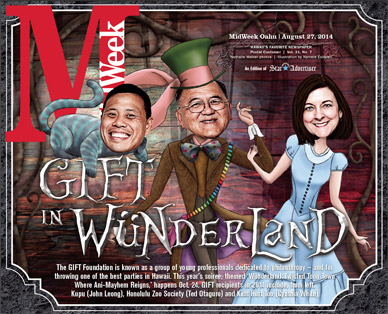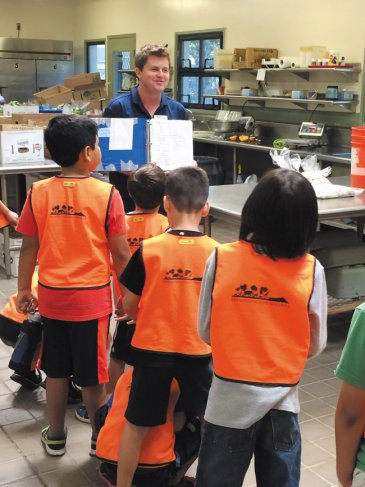GIFT In Wünderland
Kupu
At age 22, Nathan Paoa was facing some serious jail time. He had gotten into drugs, which led to him living on the streets, which led to a string of robberies and then, before he knew it, he was staring down 20 years in jail.
He had already been incarcerated and when he was picked up again for breaking his probation, the judge warned that if it happened a second time, he would have to serve his full sentence of 20 years. As a way to stay out of trouble during probation, he signed up for Kupu’s CommunityU program, which provides service learning opportunities to at-risk and underserved youths.
mw-cover-082714-giftfoundation-8
Paoa didn’t just stay out of trouble, he excelled in his new life. In CommunityU, he took part in environmental projects like maintaining lo’i, restoring fishponds and removing invasive plants. He’d wake up at 4 a.m. each day just to catch the bus to Kupu’s Kakaako site from his home in Waianae. Now, just a few months later, Nathan has graduated from the program and is working on his GED.
“Kupu CU has prepped and taught me responsibility, teamwork and that hard work does pay off,” Paoa wrote in a statement. “It also taught me the value of helping and giving back to the aina … I feel like I’m actually accomplishing something and can’t wait to accomplish more. It has helped me find my direction and gives me the opportunity to continue to grow positively.”
CommunityU, which is the Kupu program receiving GIFT funding, is just one of the organization’s several programs designed to bolster the next generation of conservation leaders that also include green-collar internships and energy-conservation training. The majority of the 16to 24-year-olds that Kupu serves comes from low-income families in rural or underserved areas.
CommunityU participants work at sites throughout the island that include Ho’oulu Aina, Lyon Arboretum, Papahana Kuaola, Ka’ala Farm, Nanakuli Botanical and Cultural Preserve, Waimea Valley and Luluku Farmers Association. It also features broader educational and career support with activities including a GED diploma program, college visits and job-interview training.
“It’s taking kids who have not finished school, have gone through the court system, have been through homelessness, come from really poverty-stricken backgrounds, and it is giving them hope and building their ability to make a difference,” explains Kupu executive director John Leong.
In recent months, Kupu, which Leong started with board member and wife Julianna Leong and chief operating officer Matthew Bauer out of his parents’ garage 10 years ago, has seen unprecedented growth. It’s got a few new programs in the pipeline, for starters. But through that growth, Leong says, CommunityU has remained underfunded.
“This (GIFT) funding really is going to build capacity to do what I feel is one of the most meaningful things that we can do — not only to impact our environment and our resources, but to turn lives around, to build people who had no hope into people who are bringing hope into our community.”
Paoa is one of many success stories of the program so far, but Kupu has bigger dreams for CommunityU. It plans to stretch the program from eight weeks to several months. It also will further develop its educational, life skills and employment readiness components.
“I think the world tells some of these kids that they are losers and they will never amount to anything,” Leong says. “And it’s really cool because here they then realize that these are all lies, and they have the ability and potential and capacity to do something really special.”
Honolulu Zoological Society
A couple of years ago, during Honolulu Zoo’s week-long educational summer camp, Honolulu Zoo Society executive director Ted Otaguro asked one excited young participant what part of the program he enjoyed the most.
Otaguro thought he knew what to expect — that the boy liked seeing the elephants or the tigers. Instead, the boy responded that he loved learning about conservation.
“He told me that he was really sad to hear that we are taking away the houses — the natural habitat — for the animals to live in, and that pretty soon, there wouldn’t be any animals left in the world. Wow! That opened my eyes!”
Honolulu Zoo Society conducts hands-on educational programs for youths like these summer camps, as well as supports Honolulu Zoo through fundraising, promoting membership and recruiting volunteers. Part of its educational programs include “Zoo to You” outreach sessions, which is where the GIFT funding will be directed. In Zoo to You, instructors bring lessons from the zoo directly to school-children.
“Many, many children who live far away — Hau’ula, Waianae, Ewa Beach — as well as some close in, many of them don’t have the opportunity to come to the zoo,” Otaguro says. “We still want to have the opportunity to get the information to them and educate them.”
The sessions cover a range of topics, including animal husbandry, animal life cycles and conservation issues. With the GIFT funding, Otaguro hopes that the society will be able to standardize these outreach sessions for DOE schools.
“It’s like any learning experience — if you read it versus doing it, the impact is much greater if you do it,” says Otaguro.
To attend Wünderland, GIFT offers $5,000 and $10,000 packages for groups of 10.
For more information, visit giftfoundationofhawaii.org.







